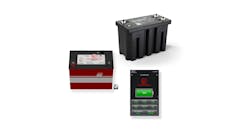Fleet owners looking for a low emission, high efficiency, and affordable engine solution will soon have new technology to turn to thanks to a partnership between Stanadyne, Katech, and the Propane Education & Research Council. The innovation combines Stanadyne’s direct injection fuel pump and injector system with Katech’s vapor lock technology to create the industry’s first medium-duty engine system that can deliver propane autogas at a constant 350-bar pressure directly into the engine. It’s all part of the three companies' combined decarbonization mission.
“The direct liquid injection system for high-vapor pressure gases such as propane autogas has been technically elusive until this joint partnership between PERC, Katech, and Stanadyne materialized,” said Dr. Gokul Vishwanathan, PERC director of research and sustainability . “This technology will be a significant enabler for high-efficiency and low-emission propane and renewable propane-powered engines and hybrids for the on-road and off-road markets.”
The breakthrough engine technology overcomes vapor lock, a common technical issue when liquified gases vaporize, which can interrupt fuel pump operation. By finding a solution, the new technology improves engine performance and efficiency. The combined system fueled a standard 6.6L GDI engine during a 250-hour performance and durability test. The tests successfully demonstrated that the technology works with existing engines and that propane autogas can be a low-carbon, high-performance replacement for gasoline and diesel engines.
“Internal combustion engines are the workhorses of our economy, and this advancement in technology will help them run much more sustainably using renewable fuels,” said Stanadyne President David Zimmerman. “The opportunity to partner with PERC and Katech on this initiative aligns with our commitment to developing solutions bridging the significant adoption gap between fossil-fueled propulsion and low-carbon and zero-carbon fueled vehicles.”
“This partnership has allowed Katech to focus more directly on the development and advancement of vapor lock systems, propane direct injection engine controls, and future propane direct injection engine applications,” said Katech lead engineer Eric Suits. “Collectively, we have produced a truly complimentary control strategy and delivery system necessary to ensure reliable propane direct injection operation under all operating conditions.”
The new technology will help fleet owners exceed the ultra-low emissions mandates going into place in 2027. Compared to diesel, propane autogas reduces harmful nitrogen oxide emissions by 96 percent and provides a five to 10 percent reduction in carbon dioxide emissions. The engine technology can also utilize renewable propane, which has a carbon intensity four times lower than conventional diesel.
“In the short term, this engine technology provides medium-duty fleet owners with a decarbonization solution to meet their immediate goals,” said Gavin Hale, director of business development at PERC. “But the real breakthrough is the long-term impact this will have to provide fleets with exactly what they need—a powerful engine that exceeds sustainability goals and reduces fuel and operation costs to provide the lowest total cost of ownership of any energy source.”
The Propane Education & Research Council is a nonprofit that provides leading propane safety and training programs and invests in research and development of new propane-powered technologies. PERC is operated and funded by the propane industry. For more information, visit Propane.com.
Stanadyne designs, manufactures, remanufactures, and sells best-in-class vehicle and powertrain pumping, injection, air and fluid management, and control solutions. Founded in 1873, the company specializes in pioneering cleaner, more efficient fuel injection technology for engines that move our world and the aftermarket and remanufactured components that help keep them operating. Stanadyne provides customers with customized design, engineering, and manufacturing solutions from its United States, China, Italy, India, and United Arab Emirates locations in partnership with its global aftermarket service dealers and distributors network. For more information, visit Stanadyne.com.
Katech Engineering is a premier performance engine and vehicle builder serving the corporate, aftermarket, and motorsport markets for more than 40 years. The company's vision is to use what they’ve learned winning races at the most demanding venues worldwide – Indy, Le Mans, Daytona, Sebring, Dakar, and many more – to develop, build, and deliver the best engines and engineered products. For more information, visit katechengines.com
To learn more about how propane can benefit the vehicles in your fleet, visit propane.com/fleet-vehicles.



